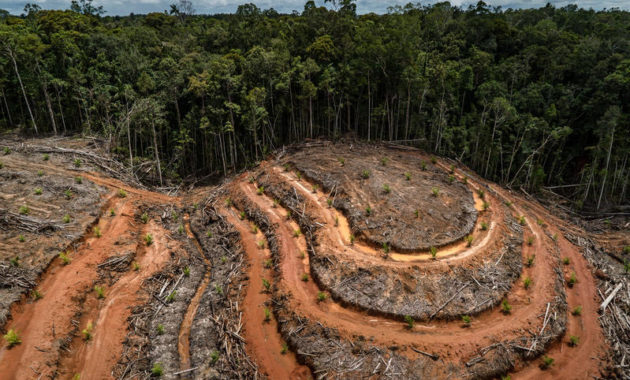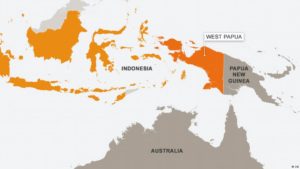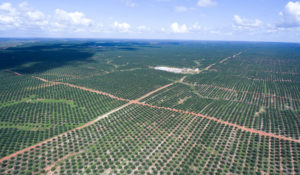An Introduction to State Crime in West Papua

The island that comprises Papua New Guinea and Indonesian ruled West Papua, is the largest island in the Pacific, with some of the widest cultural and linguistic diversity, biodiversity, and home to some of the largest mineral deposits in the world such as copper and gold. But while Papua New Guinea (PNG) is known to be an independent Melanesian state, little is known, in prominent public discourse, about West Papua. Since the colonial era, West Papuans have been engaged in a long struggle for their independence and freedom from outside rule, first as a Dutch colony, and then, in a rather complex and underhanded turn of events, as an indigenous land occupied by Indonesia. On the world map, the island can be seen split into two, and if anyone were to give pause as to how one island is split into two countries with distinctively different cultural and ethnic identities, we need to trace the series of events that occurred at the moment of decolonization.

The island as a whole saw three different colonial powers: the Germans in the north-eastern part, the Australians in the south-east, and the Dutch in the west. After the first World War, Australia took control of the German colony, holding possession of the entire Eastern half of the island, with the Dutch remaining as occupiers of the western half.
It is important to note that West Papua was a separate colony from Indonesia, and although geographically close, its indigenous inhabitants were not Javanese but Melanesian. In 1949, Indonesia won independence, however West Papua remained a colony.
With the Asia-Pacific region a battleground for influence during the Cold War, the actions of the Dutch were being closely monitored by the United States. Expecting its own independence to come, West Papua raised the Morning Star flag at the end of 1961; but this same year, Indonesian president Ahmed Sukarno announced Indonesia’s intentions to incorporate West Papua into its territory. With the threat of communist influence in Indonesia, which was engaging in a military buildup with arms supplied by the Soviet Union in order to stake its claim to West Papua, the US urged the Dutch to consider Indonesia’s request. In a letter to the Dutch Prime Minister, John F. Kennedy referred to the situation as a “PR problem” and wrote that the consequences of such a conflict would be “out of all proportion to the issue at stake…only the communists would benefit…[T]he Netherlands Government has committed itself to the Papuan leadership to assure those Papuans of the right to determine their future political status. The Indonesians, on the other hand, have informed us that they desire direct transfer of administration to them but they are willing to arrange for the Papuan people to express their political desires at some future time.”
An internal memorandum from then US Secretary of State Dean Rusk, outlined the ways in which both parties might be convinced to agree to the US’s proposed course of action, serving their political interests.
In August of 1962, the New York Agreement was signed at the UN Headquarters. This document transferred administrative control of West Papua to a UN Temporary Executive Authority (UNTEA) and subsequently on to Indonesia with the provision that a vote for self-determination would follow soon afterwards. This vote was to take place in 1969, and was called the Act of Free Choice, however to West Papuans it is commonly referred to as the Act of No Choice.
Whilst the New York Agreement stated that all adult West Papuans were to participate in the vote – a feat that would have required far more effort than they were evidently willing to expend – less than 1% of the population, a total of 1,024 delegates actually voted. Multiple accounts of the voting process recall bribery, threats as well as the actual vote itself being a gunpoint referendum. Recently declassified documents from the NSA archives confirm that from the beginning, there was no real intention for West Papuans to have any chance of independence. A telegram from the US Department of State refers to the West Papuans as “stone-age, illiterate tribal groups whose horizons are strictly limited…Free election among groups such as this would be much more of a farce than any rigged mechanism Indonesia could devise.”
During the UN transitional administration, the Indonesian government began to subsidize families to move to West Papua, a policy known as transmigration. Between 1969 and 1989, the government helped approximately 730,000 families from other parts of Indonesia relocate to “less inhabited” parts of their territory, in an effort that was seen as a way of diluting the ethnic concentration of West Papua and undermining the indigenous peoples claim to their land. The policy of transmigration has facilitated an increase in the numbers of Internally Displaced Persons (IDP), a position that is called translokal by the West Papuans. The cultural ramifications of land loss have deep roots in spiritual ancestry, with the purging of ancestral land seen to evict not only those who live on it but the spiritual ancestors as well, severing a vital connection.
For a newly independent nation trying to stand on its own legs in the global economy, West Papua’s vast richness in natural resources was a treasure chest. Today, Freeport Mine is one of Indonesia’s most important sources of tax income, and the recent discovery of gold deposits in Wabu Block promises to be even larger, heralding an even greater threat to the villages, food, water sources and culture of indigenous peoples. The development of Wabu Block will lead to an increase in displacement, forcing communities to become either translokal or cross the border to the refugee camps in Papua New Guinea.
Appeals to the International Community
Since the 1960s, West Papuans have been engaged in a struggle for their freedom that spans across the globe. While there are armed guerilla factions on the ground, in the international political sphere, the United Liberation Movement for West Papua is the umbrella body for the various organisations and self proclaimed Provisional Government of West Papua, headquartered in Port Vila, Vanuatu. The Free West Papua Campaign, founded and led by prominent activist Benny Wenda, has branches in the UK (Oxford), The Netherlands (The Hague), Poland, Denmark, the US (LA), Papua New Guinea (Port Moresby), and Australia (Perth and Sydney).
Petitions for self determination have been brought to the UN working Group on Indigenous Peoples as well as to the General Assembly and the Decolonisation Committee. In response to the latter, chair of the committee, Rafael Ramirez stated that the committee did not receive, and could not receive any document or request related to West Papua as it is an “integral” part of Indonesian territory.
Statements of support from Ban Ki-Moon were also rapidly retracted/explained as “off the cuff” responses that led to a misunderstanding of his intentions.
Media blackouts, arrests and the killing of activists are all regular features of life for West Papuans under a regime that has no plans to let go of their most profitable territory. As awareness of the situation in West Papua increases, the Free West Papua Campaign team is working around the clock to build the future their people desire and envision. This July, the Melanesian Spearhead Group Summit (MSG) will be held in Port Vila. A decision will be made as to whether West Papua will finally be granted full membership. If successful, this will be one of the biggest diplomatic wins for them to date.
Settler Colonialism
Until 2000, West Papuans faced an intentional and systematic form of settler colonialism. As a government sponsored program, hundreds of thousands of people were aided in relocating from other parts of Indonesia to a wide range of areas in West Papua. Additionally, families that relocated were given two hectares of land on which to build and farm, leading to the reallocation of tens of thousands of hectares of indigenous lands. This move came as a policy in response to the 1984 OPM uprising, which much to Indonesia’s dismay proved to be a highly organized and meticulously planned campaign. Today, the urban centres and coastal towns of West Papua are primarily dominated by Indonesians, providing economic opportunities for them through tourism, mining and logging. In stark contrast, some of the highest poverty levels in Indonesia () are in the highlands and rural areas of West Papua where the increasingly disenfranchised and internally displaced peoples are forced to watch their land be exploited and themselves ethnically cleansed. News from West Papua regularly reports military and police brutality, arrests, and the killing of independence activists. Whilst transmigration, as an official policy, ended in 2000, economic migration continues to this day, and its continuation belies its relative success.
Palm oil & Deforestation
In addition to the environmental degradation from mining, millions of hectares of land are set aside by the Indonesian government for palm oil plantations. The production of palm oil increases soil erosion, decreases water quality, leads to loss of forest cover and habitat for endangered species and contributes to climate change through its production of carbon sinks. In fact, Indonesia is the third largest global emitter of greenhouse gasses. West Papuans also note a link to an increase in disease, air pollution and crop pests.
In a report from 2014 analyzing satellite images of West Papua over the years, it is noted that roughly 83% of palm oil expansion has occurred at the expense of forests. Government policy allows “palm oil estates to be twice the size of those in other provinces in Indonesia.”
Yet another megaproject slated to take place on West Papuan land is the Trans Papua Highway. Penetrating remote areas, the network of roads is planned to be 2,700 miles in length with the aim of increasing access to the minerals, timber, palm oil plantations and other exploitable natural resources. While the government byline is that the highway is yet another venture that will produce jobs and increase quality of life, the Melanesian communities know only too well what this means for their lands, their customs and ways of life.
The myriad plans that the Indonesian government have for West Papua might possibly produce jobs for some, but what it will certainly do is create toxic waste, poison food and water sources, devastate some of the world’s richest coral reefs, destroy some of the most untouched and biodiverse forest left on our planet, produce large carbon sinks and further displace and oppress the West Papuans.









































